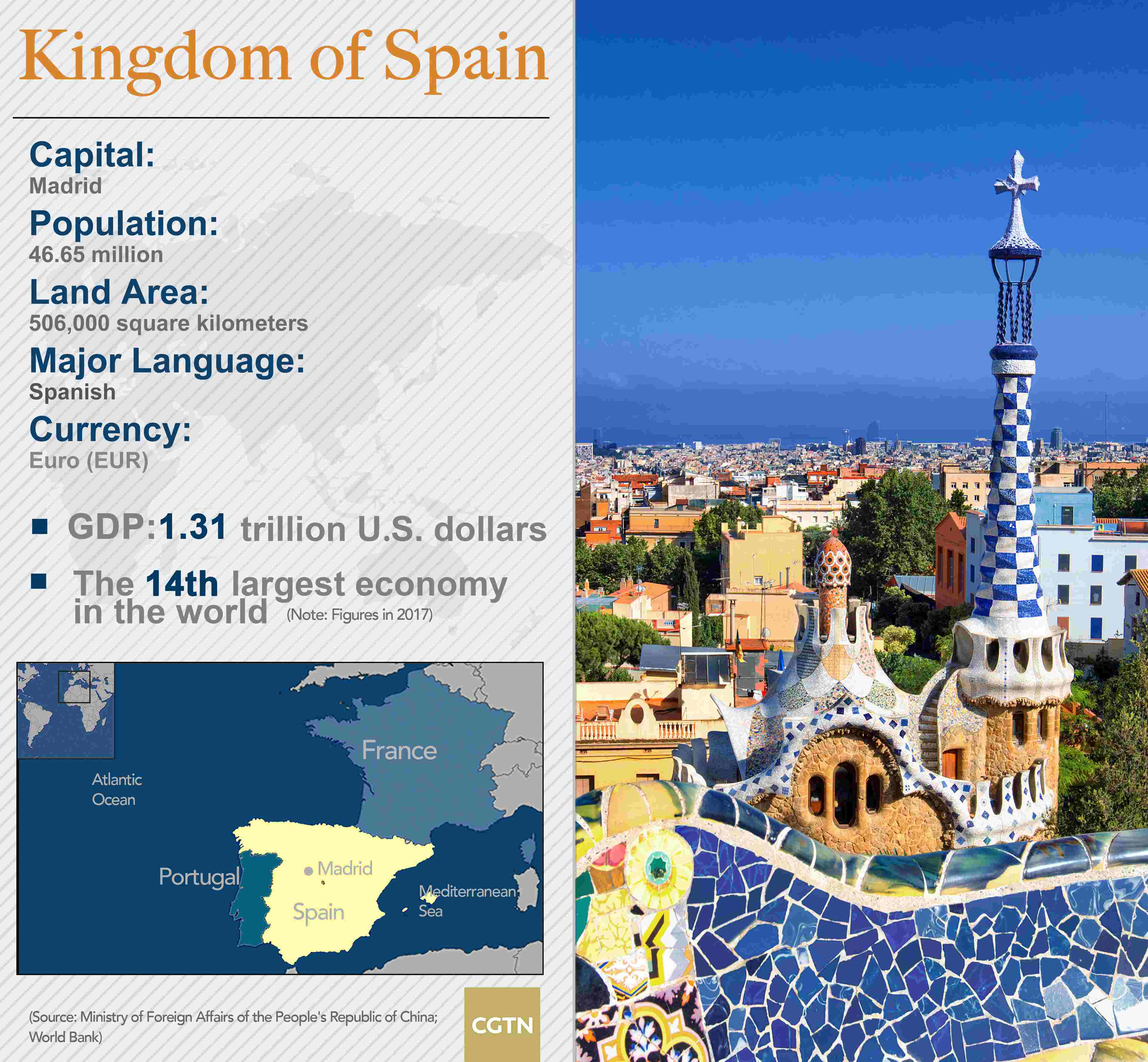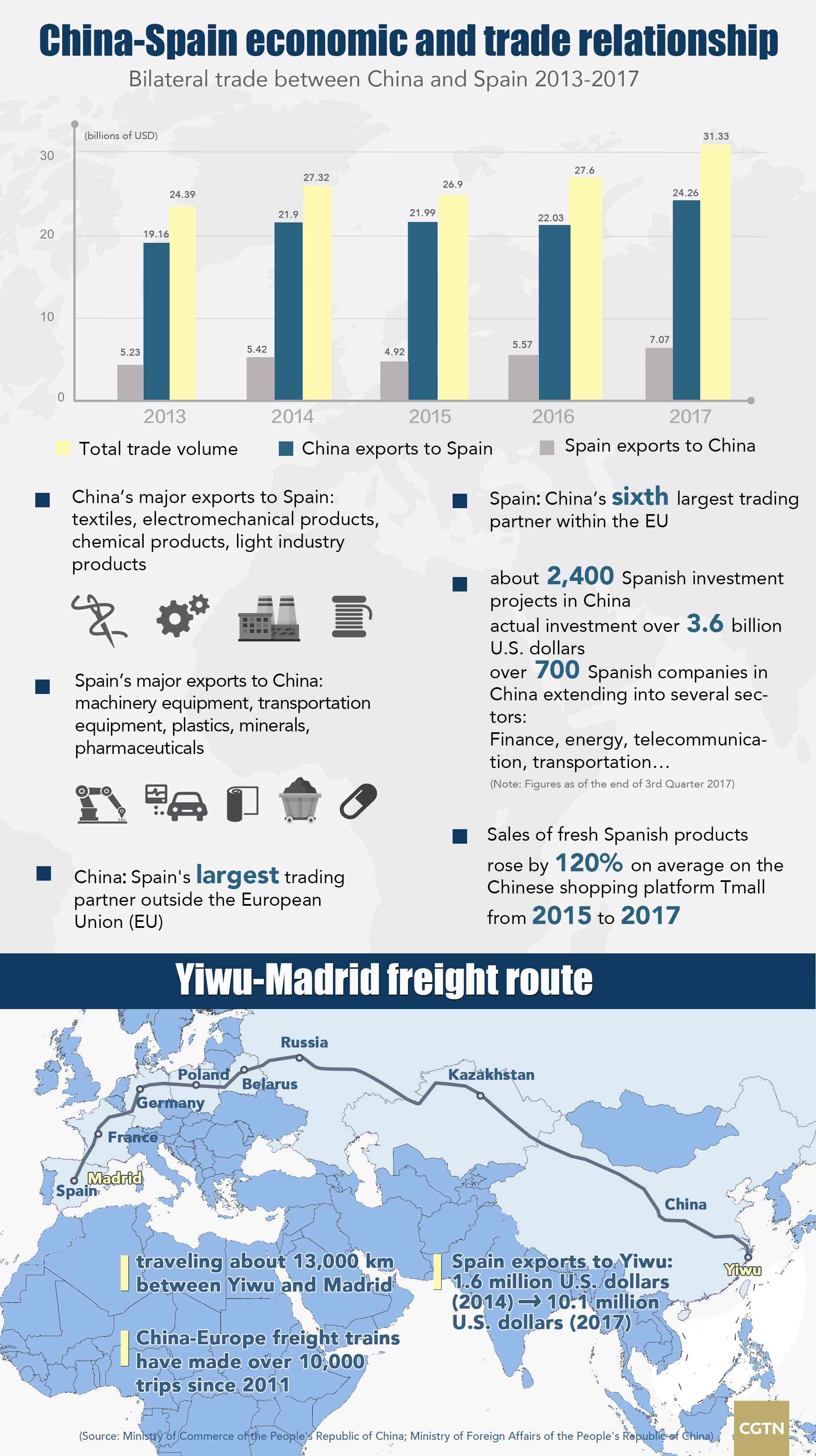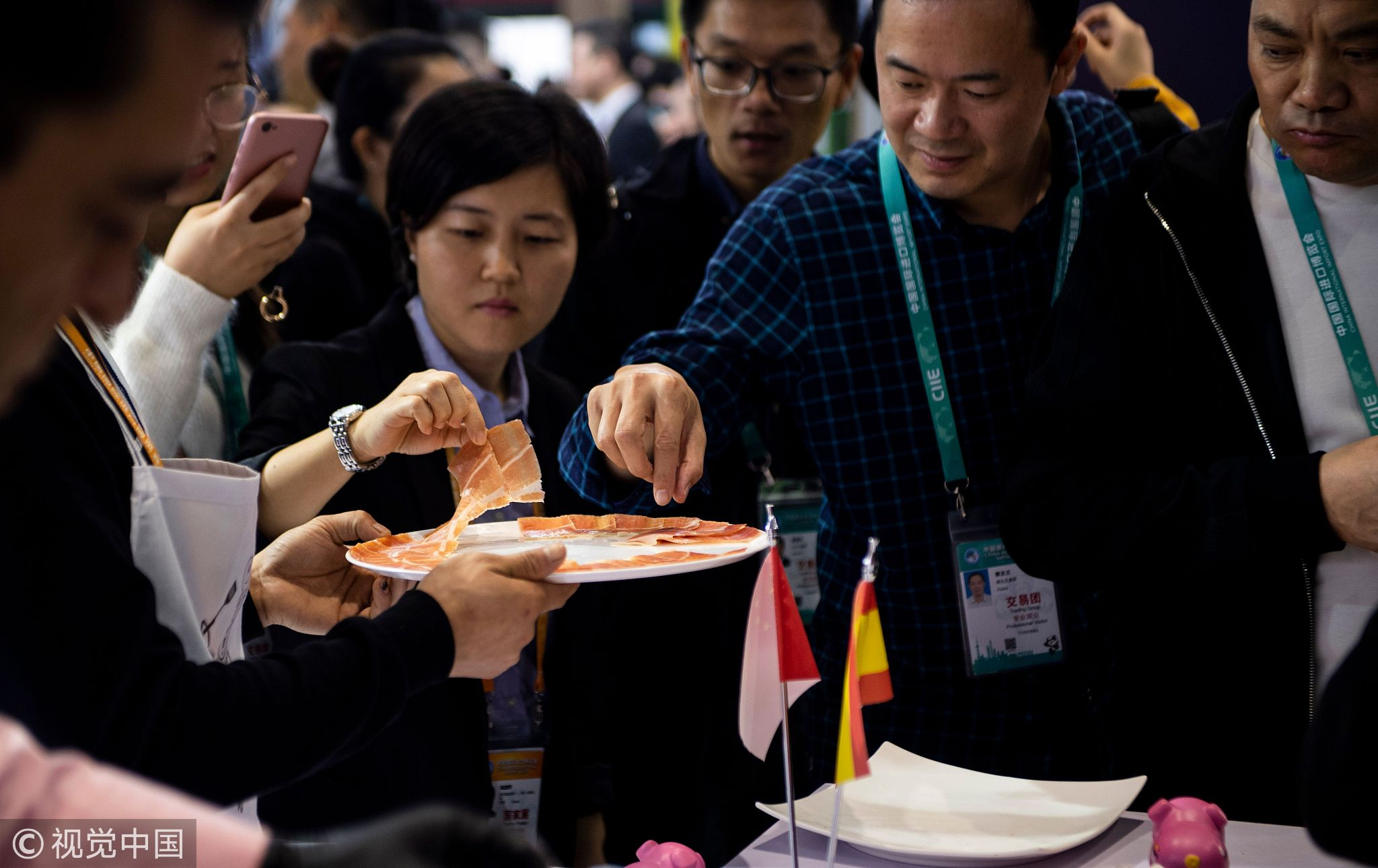
Politics
16:16, 27-Nov-2018
From ancient to modern: China, Spain eye closer ties under BRI
Updated
15:28, 30-Nov-2018
By Liu Yuyao

Chinese President Xi Jinping will be in Spain for a state visit from November 27 to 29, the first stop of his state visits to Spain, Argentina, Panama and Portugal.
During his trips to the four countries, President Xi will attend the 13th Group of 20 (G20) summit from November 30 to December 1 in Buenos Aires, the capital city of Argentina.
Xi's visit to Spain marks the first state visit of a Chinese president in 13 years after the 2005 visit of former Chinese President Hu Jintao.
This year marks the 45th anniversary of the establishment of the diplomatic relations between China and Spain as well as the 13th anniversary of their comprehensive strategic partnership.
China and Spain have experienced tremendous progress in collaboration in various fields since 1973 when the two countries established diplomatic ties, and Xi's visit to the European country will inject new impetus into the development of Sino-Spanish relations in the new era.

Intensified economic cooperation
The economic and trade relations between China and Spain have continuously advanced at a good pace in recent years.
China, as the main economic and trading partner in Asia of Spain, has become the major destination for Spanish exports as well as Spain's largest trading partner outside the European Union.
Trade and investment between the two countries have steadily increased in recent five years as bilateral trade volume rose from 24.4 billion U.S. dollars in 2013 to a record 31.3 billion U.S. dollars in 2017.
China exports to Spain products such as textiles, electromechanical products, chemical and light industry products, while Spain sends to China machinery equipment, plastics, minerals and pharmaceuticals.
Currently, the Chinese economic growth model is undergoing profound transformation featured by greater economic opening and further extension of the market, which provides new opportunities for Spanish companies to invest in China.

The engagement of Spanish companies in China has paralleled the evolution of Sino-Spanish relations. Statistics show that there have been over 700 Spanish companies do business in China with actual investment over 3.6 billion U.S. dollars in the fields of finance, energy, telecommunications and transport.
Meanwhile, Chinese investments in Spain have seen a rapid growth since the European debt crisis. By the end of 2017, the stock of Chinese investment in Spain had exceeded 2.3 billion U.S. dollars covering various areas including energy, finance, transport, telecommunications, infrastructure, agriculture, food industry and tourism.
The just-ended first China International Import Expo (CIIE) also represented a significant opportunity for Spain to expand exports to China.
Spain selected 36 enterprises for the CIIE, including companies from the food and beverage sectors, fashion and habitat companies, among others, aiming to brand its image to increase the recognition of Spanish products by Chinese consumers.
Numerous Chinese companies and customers visited Spanish pavilions during the exhibition, and an agreement was reached between the Tianjin Football Association and the Spanish Football Academy, a step forward for the China-Spanish cooperation in sports.

Chinese visitors try ham from Spain at the first CIIE in Shanghai, November 6, 2018. /VCG Photo
Chinese visitors try ham from Spain at the first CIIE in Shanghai, November 6, 2018. /VCG Photo
Along the modern Silk Road
In 2013, China launched the Belt and Road Initiative (BRI), with focus on the development of the modern Silk Road and maritime trade routes connecting Asia, Middle East, Europe and Africa.
Spain, located at the intersection of the Silk Road Economic Belt and the 21st-century Maritime Silk Road, takes an active part in the construction of the BRI to promote pragmatic cooperation with China.
The BRI offers numerous opportunities for the Spanish business, and Spain also acts as a gateway for Chinese companies eyeing investments in Latin America and Africa due to its unique, advantageous geographic location.
Under the framework of the BRI, China and Spain have carried out important cooperation in many areas, including economy, trade, culture, and tourism.
The Yiwu-Madrid Railway, one of the first outcomes of the BRI, began operation in 2014, boosting the economic cooperation between China and Spain.
Covering eight borders and stretching some 13,000 kilometers, the railway connects China's Yiwu City, the world's largest wholesale center for small goods, with Spanish capital Madrid, serving as not only a platform for more convenient trade and logistics but a bond to enhance communication between the two countries.

China opens a cargo train service linking the eastern city of Yiwu, the world's largest wholesale market for small goods, and Madrid in Spain, November 18, 2014. /VCG Photo
China opens a cargo train service linking the eastern city of Yiwu, the world's largest wholesale market for small goods, and Madrid in Spain, November 18, 2014. /VCG Photo
Spain has seen a huge increase in exports to Yiwu with 10.1 million U.S. dollars in 2017 compared to 1.6 million dollars in 2014 thanks to the opening of the rail line.
The Yiwu-Madrid Railway is part of the China-Europe freight rail services, accelerating China's opening up and boosting the economic and trade cooperation with countries along the Belt and Road route.
Flourishing cultural exchanges
The relations between China and Spain go beyond the economic and trade sectors. The two grand cultural countries also enjoy broad prospects for development of people-to-people and cultural exchanges and cooperation.
The enthusiasm of both peoples for learning the language and understanding the other's culture grows. China included Spanish in the country's senior high school curriculum this September, and Spain will also make efforts to bring Chinese into its national education system.
The number of Chinese tourists to Spain has also witnessed rapid growth in recent years: Spain received 514,000 Chinese tourists in 2017, an increase of more than 37 percent over the previous year. In the summer holiday of 2018, Spain ranked fifth among the most popular outbound destinations for Chinese visitors.
Spain coincides with Chinese tourists in many aspects including history, culture, historical sites, food and football, an important reason behind the growing number of Chinese tourists in Spain.

Chinese tourists appreciate Antoni Gaudi's works at Casa Mila in Barcelona, Spain, May 30, 2018. /VCG Photo
Chinese tourists appreciate Antoni Gaudi's works at Casa Mila in Barcelona, Spain, May 30, 2018. /VCG Photo
The cultural communication and cooperation mechanism under the framework of the BRI has opened the door to new possibilities of exchanges and collaboration between China and Spain.
The ties between China and Spain have a long history dating back to the era of the ancient Silk Road. The two countries already developed commercial relationships as early as the 15th century.
During President Xi's visit to Spain, the two countries are expected to publish a joint statement and sign documents to boost their collaboration in the third-party markets, service trade, taxation, culture, science and technology, and finance.
We have good reason to believe that China and Spain, both are countries with an ancient civilization, will enjoy closer interconnections within the framework of the BRI in the new era.
(Infographics by CGTN's Li Yueyun)

SITEMAP
Copyright © 2018 CGTN. Beijing ICP prepared NO.16065310-3
Copyright © 2018 CGTN. Beijing ICP prepared NO.16065310-3